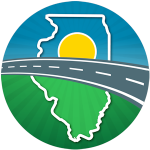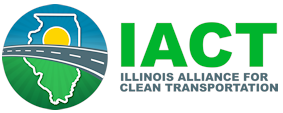IACT has made a specific effort to include sources that serves various geographic areas across the state of Illinois; however, please note this page is not exhaustive. Should you see any programs omitted below, please contact us at info@il-act.org
Click HERE to download the latest IACT Grant Funding Fact Sheet.
Last updated July 1, 2025
FTA | Low or No Emission Grant Program and Grants for Buses and Bus Facilities Program
Distributed by the Federal Transit Administration (FTA).
On May 14, 2025, the FTA announced the release of $1.5 billion in funding through the FY25 Notice of Funding Opportunity for the Grants for Buses and Bus Facilities and Low or No Emission Program.
Eligible applicants include direct or designated recipients of FTA funding, states, local government authorities, and Indian Tribes. For projects in rural (non-urbanized) areas—excluding those proposed by Indian Tribes—applications must be submitted as part of a consolidated state proposal. States and other eligible entities may also submit consolidated proposals for projects located in urbanized areas.
Eligible activities:
- purchasing or leasing low- or no-emission buses
- acquiring low- or no-emission buses with a leased power source
- constructing or leasing facilities and related equipment (including intelligent technology and software) for low- or no-emission buses
- constructing new public transportation facilities to accommodate low- or no-emission buses
- rehabilitating or improving existing public transportation facilities to accommodate low- or no-emission buses
- Additionally 0.5% of a request may be for workforce development training and an additional 0.5% may be for training at the National Transit Institute (NTI). Applicants proposing any project related to zero-emission vehicles must also spend 5% of their award on workforce development and training as outlined in their Zero-Emission Transition Plan, unless the applicant certifies that their financial need is less.
Application deadline: July 14, 2025
DOE | Vehicle Technologies Office (VTO) Program Funding Opportunity
Distributed by the Department of Energy (DOE).
The U.S. Department of Energy (DOE) announced the Fiscal Year 2025 Vehicle Technologies Office (VTO) Program Wide funding program. This funding opportunity will award up to $88 million for projects that will seek innovative transportation solutions for on- and off-road vehicles.
NOFO topic areas:Technologies for Enhanced Lithium-Ion Cell Safety; Low-Cost Production of Lithium; Lithium-Metal Surface Protection; Ultra-Long-Cycle Life Li-Ion Batteries for Heavy-Duty Electric Trucks; Standardized Battery Module Design for Heavy-Duty Electric Trucks; Thermal Technologies for Zero-Emission Vehicles (ZEVs); Optimized Grid Planning for Electric Vehicles using Advanced Metering Infrastructure; Co-located Renewable Fuel and Off-road vehicle Pilots (CROP); Vehicle Life Cycle Analysis Baseline; Quality Improvements of Battery Busbar Joining; Electric Vehicle Workforce Development; or Vehicle Technology Integration Open Topic.
Submission Deadline for Concept Papers: April 1, 2025, 5:00 p.m. ETSubmission Deadline for Full Applications: June 18, 2025, 5:00 p.m. ET- Expected Date for EERE Selection Notifications: November 5, 2025, 5:00 p.m. ET
- Expected Timeframe for Award Negotiations: February 2026
FHWA | Carbon Reduction Program
Distributed by the Federal Highway Administration
Funded from Oct. 1, 2021–Sept. 30, 2026
The Carbon Reduction Program provides funding to develop carbon reduction strategies and fund projects to reduce carbon emissions from on-road highway sources.
Funds can be stacked with other eligible USDOT funding for projects, if the eligibility requirements and applicable Federal share are met for each program.
FHWA | Congestion Mitigation and Air Quality Improvement
Distributed by the Federal Highway Administration to each state
Funded from Oct. 1, 2021–Sept. 30, 2026
CMAQ funds the purchase of medium- and heavy-duty electric vehicles and EV charging infrastructure.
Projects must be located in nonattainment or maintenance areas for ozone, carbon monoxide, and/or particulate matter.
Eligible entities include state departments of transportation, local governments, and transit agencies. Non-government organizations may apply for funding if they enter into a public-private partnership with the above eligible entities.
Up to 50% of CMAQ funds can be transferred to qualified programs such as the National Highway Freight Program and the Carbon Reduction Program.
FHWA | Reduction of Truck Emissions at Ports Grant Program
Distributed by the Federal Highway Administration
Funded from Oct 1, 2021–Sept 30, 2026
20% Required Match
This program provides funding to study truck idling and zero-emission alternatives at ports and for eligible entities to deploy projects in or adjacent to ports that reduce port emissions; including:
- Development of port-related infrastructure
- Usage of on-truck technologies
- Usage of low- or zero-emissions powertrains or fuels
- Reduction of congestion in or adjacent to ports
- Electrification or improvement in the efficiency of port operations
Funding will be made available each fiscal year.
Distributed by the Department of Commerce, Economic Development Administration (EDA)
Applications are accepted on an ongoing basis.
Applications are submitted through EDA's Economic Development Grants Experience Portal.
The Research and National Technical Assistance Grant supports research and technical assistance projects, including workforce development and technical assistance relative to EVs.
The Planning and Local Technical Assistance Grant Program serves to support recipients with short-term and state-planning investments designed to guide the eventual creation and retention of high-quality jobs. This funding can be used for EV technical assistance, infrastructure planning, and workforce development. To view the regional offices, Notice of Funding Opportunity (NOFO) number, and states served, please visit the website.
USDA | Community Facilities Direct Grant Program
Distributed by the Department of Agriculture, Rural Development
Application window is open year-round.
As part of the Community Facilities Direct Loan and Grant Programs, the Community Facilities Grant Program provides additional funding, along with that for vehicle acquisition for communities in rural areas.
Eligible borrowers include public bodies, community-based non-profit organizations, and federally-recognized tribes in cities, villages, townships, and towns with no more than 20,000 residents according to the latest U.S. Census Data.
There are several Clean Vehicle and Energy Credits through the IRS made available by the Inflation Reduction Act of 2022 for individuals, businesses, as well as tax exempt and government entities via tax credits and deductions. Credits are available through 2032.
- Alternative Fuel Vehicle Refueling Property Tax Credit (30C)
-
Allows individuals to receive a tax credit of 30% of the cost of the EV charging infrastructure, with a maximum amount of $1,000 in low-income community or a non-urban area.
-
Businesses will receive a 6% tax credit for the cost of the EV charging infrastructure, with a maximum amount of $100,000 per unit of property (i.e., per charging station). If the EV charging infrastructure installed by the business meets certain prevailing wage and apprenticeship requirements, the eligible tax credit increases to 30%.
-
- Commercial Clean Vehicle Tax Credit (45W)
-
Businesses and tax-exempt organizations qualify for the credit.
-
Less than 14,000 pounds (typically cars, vans, trucks, and similar passenger-sized vehicles): maximum credit $7,500
-
14,000 pounds or more (typically larger vehicles like school buses and semi-trucks): maximum credit $40,000
-
- New Clean Vehicle Tax Credit (30D)
-
Allows individuals to receive a credit of up to $7,500 for a new electric vehicle.
-
Must meet certain income and vehicle requirements.
- $3,750 if the EV meets the critical minerals requirement only
- $3,750 if the EV meets the battery components requirement only
- $7,500 if the EV meets both
For more information on qualified vehicles, please visit the website.
-
- Used Clean Vehicle Tax Credit (25E)
- Allows individuals to receive a tax credit of 30% of the sale price, with a maximum credit of $4,000 for a used electric vehicle.
- Individuals will also be able to “transfer” the credit to a qualified dealer and receive the credit as a point-of-sale incentive instead of a tax credit.
ComEd Business Customer EV Rebates
Business and public sector customers may qualify to get a rebate for upgrading vehicles to electric.
- Fleet Vehicles, Class 1-2 (Light duty) rebates
- Base rebate: $5,000
- Select Customers Rebate*: $7,500
- Fleet Vehicles, Class 3-6 EV (Medium duty) rebates
- Base rebate: $20,000
- Select Customers Rebate*: $30,000
- Fleet Vehicles, Class 7-8 EV (Heavy duty) rebates
- Base rebate: $50,000
- Select Customers Rebate*: $75,000
- Transit Bus >=30’ rebates
- Base rebate: $80,000
- Select Customers Rebate*: $120,000
- K-12 School Bus >=35’ rebates
- Base rebate: $120,000
- Select Customers Rebate*: $180,000
ComEd is working to establish a process to enable pre-approved rebate vouchers that can be applied at the point of purchase for new vehicles and a post purchase solution for pre-owned vehicles.
ComEd Business Customer Make-Ready Rebates
Business and public sector customers can also receive rebates on make-ready infrastructure, whether located on the customer side or ComEd side of the meter for Level 2 (“L2”) and Direct Current Fast Chargers (“DCFC” or Level 3).
- Make-Ready Rebates for infrastructure serving Level 2 (L2) Charger
- Base Rebate: Make-ready rebate of up to $5,333 per port with a 10-port maximum
- Select Customers* Rebate: Make-ready rebate of up to $8,000 per port with a 10-port maximum
- Make-Ready Rebates for infrastructure serving Direct Current Fast Chargers (DCFCs or Level 3 chargers)
- Base Rebate: Make-ready rebate of up to $667 per kW with a minimum of 50 kW (maximum rebate of $500,000)
- Select Customers* Rebate: Make-ready rebate of up to $1,000 per kW, with a minimum of 50 kW (maximum rebate of $500,000)
Learn more about Make-Ready Infrastructure here.
ComEd Rebates | Residential
The program offers rebates for the installation and purchase of Level 2 (L2) electric vehicle (EV) chargers that are "smart" (i.e. Wi-Fi enabled), ENERGY STAR® certified, and Nationally Recognized Testing Laboratory (NRTL) certified to Residential ComEd Customers. Charger installation must be completed before submission of a Program application.
The base rebate is up to $2,500, for Select Customers the rebate is up to $3,750. See the program terms and conditions for more information on eligibility for the higher rebate.
Incentives are available to Illinois propane customers who purchase a new propane vehicle. Any propane vehicle that is registered and operated in the state of Illinois is eligible for up to $4,000 for the purchase of a new propane vehicle or cost of the conversion if less than $4,000.
All rebate and incentive applications must be submitted by your Illinois propane provider to qualify. If you have purchased a new propane vehicle or converted a vehicle to propane, contact your propane provider to apply. View the Rebate Guidelines for more information.
Learn more on the Illinois Propane Gas Association website.
The U.S. Department of Energy’s Alternative Fuels & Advance Vehicles Data Center is your source to finding the federal and state incentives and laws surrounding air quality, fuel efficiency, and alternative fuels and advanced transportation technologies.
*New and used EV federal tax credits will not be available after September 30, 2025.*
CURRENTLY CLOSED. To receive updates on the EV rebate program, including when the next cycle will open, sign up for ILEPA's listserv.
Distributed by the Illinois Environmental Protection Agency
Anticipated to open mid-January.
The Illinois EPA plans to open the next rebate application cycle in mid-January 2025. The Illinois General Assembly has appropriated $14 million for rebates in the current fiscal year.
- $4,000 Rebate for an All-Electric Vehicle
- $1,500 Rebate for an All-Electric Motorcycle
For details on eligibility, visit IEPA’s Electric Vehicle Rebate Program page.


